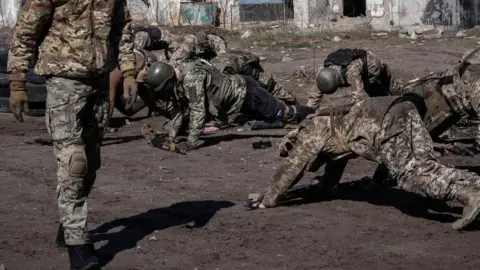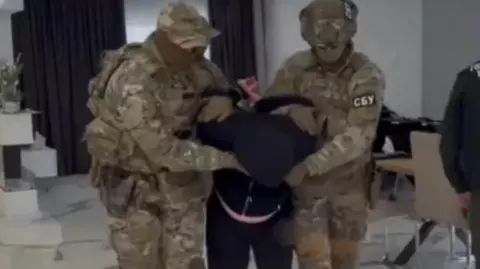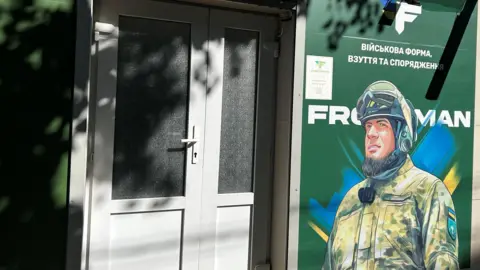ARTICLE AD BOX
Nick Thorpe
Central Europe correspondent
Reporting fromBudapest

 EPA
EPA
The 45 year old died in a psychiatric hospital three weeks after being forcibly conscripted (file photo)
The death of a 45-year-old ethnic Hungarian in Ukraine, weeks after he was conscripted into the Ukrainian army, has provoked a furious row between the Hungarian government and authorities in Kyiv.
Jozsef Sebestyen, a dual Ukrainian-Hungarian citizen, was beaten with iron bars after he was forcibly conscripted on 14 June, his brother and sister have told Hungarian media.
Sebestyen, from Berehove in western Ukraine, died there in a psychiatric hospital on 8 July.
The circumstances surrounding his death have been denied by the military, but his case has shone a light on forced conscription in Ukraine as the army seeks to defend the front lines from Russia in the face of heavy losses.
"They took me to a forest with many other men and started beating me there," Sebestyen is quoted by Hungary's Mandiner news site as having told his brother and sister.
"The beatings were mainly to the head and body. They said that if I didn't sign something, they would take me to "zero" [the front line]. It hurt so much, I couldn't move."
On 10 July, Ukrainian ambassador Sandor Fegyir was summoned to the Hungarian Foreign Ministry in Budapest over the case.
Prime Minister Viktor Orban, a bitter critic of the Ukrainian government and war effort, posted on Facebook: "A Hungarian citizen was beaten to death in Ukraine. A few kilometres from the Hungarian border. A country where this can happen cannot be a member of the EU."
Later the same day, the Ukrainian army published its full denial.
"According to the final report of the hospital, no physical injuries were found during the medical examination," the statement said.
"We firmly reject any allegations of forced labour, inhuman treatment or human rights violations, whether by the Territorial Military Centres or other military officials."
The army goes on to say that it would be open to a "transparent investigation under Ukrainian law".

 SBU
SBU
In May, Ukraine's SBU security service announced the arrest of two Ukrainian citizens accused of spying for Hungary
The incident has become the latest flashpoint in a war of words between Orban's government in Budapest and Volodymyr Zelensky's administration in Kyiv.
In May, a spy row sparked arrests in both countries and tit-for-tat expulsions of diplomats.
At the end of June, the Hungarian government published the results of its latest "national consultation", in which it presented eight reasons for not allowing Ukraine into the EU, and invited citizens to vote No.
More than two million did so, according to the results, which were not independently verified.
Allegations of violence during forced conscription in Ukraine are not new. Ukrainian men are eligible for the army from the ages of 25 to 60, and most men from the age of 18 are barred from leaving the country.
- Ukraine in new mobilisation drive as Russia advances
- Conscription squads send Ukrainian men into hiding
- War of words over Ukrainian POWs handed to Hungary
"I keep hearing from relatives of those taken by the military that they receive back their clothes covered in blood," a Hungarian woman in Transcarpathia told the BBC on condition of anonymity.
"The situation has been getting worse since the start of the war, but it got particularly bad in the past two months."
Often, she continued, medical certificates granting exemption from the draft are ignored by the soldiers - and the holders are bundled unceremoniously into vehicles and taken away. Thousands of dollars, "insane sums", were being demanded in exchange for being left in peace.

 BBC/Nick Thorpe
BBC/Nick Thorpe
Most Ukrainian men, aged between 25 and 60, are eligible for military service
There are also allegations that critics of the government, including journalists, are deliberately targeted for conscription.
Oleh Dyba, 58, the editor of Zakarpattya Online, is now on hunger strike in military detention. He alleges he was taken because his articles investigating the construction of wind turbines in the Carpathian mountains upset the authorities.
Ukrainians can take cases of unfair or violent conscription to the office of the Ukrainian ombudsman for human rights, Dmytro Lubynets.
He said recently that his office had received 3,500 complaints for human rights violations regarding conscription in 2024, and more than 2,000 complaints so far this year.
Criminal cases have been brought against more than 50 recruiters, he said.
The right to conscientious objection was abolished in Ukraine when martial law was declared in February 2022 - the month Russia launched its full-scale invasion.
At the request of Ukraine's Constitutional Court, the Venice Commission of the Council of Europe issued an opinion on alternative service in Ukraine in March 2025.
"States have the positive obligation to set up a system of alternative service which must be separated from the military system, shall not be of a punitive nature and remain within reasonable time limits," it said.

 4 hours ago
11
4 hours ago
11








 English (US) ·
English (US) ·